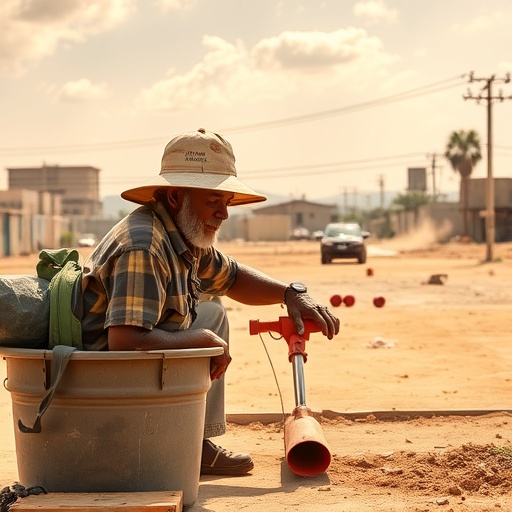As the United States contends with increasingly intense and frequent heat waves, the implications extend beyond environmental concerns into a critical public health and workforce crisis. Recent research conducted by Rutgers Health in collaboration with the City University of New York (CUNY) reveals a stark reality: older workers, particularly those from Black, Latino, and low-income communities, are disproportionately vulnerable to the detrimental effects of extreme heat exposure in their work environments. Their risk of developing work disabilities rises significantly as a consequence of this climatic stressor.
This groundbreaking study, published in the peer-reviewed journal Generations, systematically examines how occupations sensitive to extreme heat contribute to health-related limitations on work capacity among adults aged 50 and above. Utilizing nationally representative datasets, researchers have identified that jobs requiring outdoor labor—such as agriculture, construction, and related fields—or indoor occupations lacking adequate climate control are closely correlated with increased reports of health-imposed work restrictions. The populations holding these jobs are often marginalized: predominantly men, immigrants, and individuals facing socioeconomic disadvantages, many of whom already contend with chronic health conditions like obesity and diabetes.
Insight into the occupational landscape from the Bureau of Labor Statistics Occupational Requirements Survey affirms that approximately 33% of the civilian workforce is engaged in roles entailing significant outdoor exposure. This statistic underscores the magnitude of the workforce at risk and amplifies concerns about the adequacy of protections for these workers, many of whom have limited agency or resources to mitigate harm caused by extreme heat.
Mara Getz Sheftel, PhD, lead author and instructor at the Rutgers Center for State Health Policy, highlights the multidimensional nature of the crisis: “Extreme heat is not just an environmental issue, it’s a health and workforce issue.” Sheftel emphasizes that marginalized groups are most frequently exposed to occupational heat, which compounds their long-term health vulnerabilities. This exposure results in chronic health impacts that not only diminish quality of life but also curtail the ability to maintain employment, thereby perpetuating cycles of economic and social disadvantage.
The study also surfaces glaring disparities in workplace protections and access to healthcare services. Informal, temporary, or gig economy workers—such as delivery drivers and street vendors—often lack benefits like employer-sponsored health insurance and are routinely excluded from occupational safety regulations related to heat stress. This regulation gap exacerbates the vulnerability of already marginalized workers, who face the compounded burden of workplace hazards without lawful or institutional safeguards.
While some municipalities and states have enacted local regulations addressing heat exposure in occupational settings, the researchers advocate for robust federal policies as an urgent priority. Proposed regulatory measures by the Occupational Safety and Health Administration (OSHA) aim to mandate employer provisions, including readily available water supply, mandated rest breaks, and comprehensive heat illness prevention plans. However, these rules have yet to come into force, leaving the most vulnerable workforce segments without legally enforceable protections.
Without comprehensive measures, there is a risk that the workers most exposed to heat-related health complications will be neglected in policy frameworks and workplace safety protocols. Sheftel warns that this oversight could drive increases in both disability rates and economic insecurity among older workers, particularly in communities already marginalized by race, income, and immigration status.
The research team urges policymakers to consider a spectrum of prevention strategies that extend beyond immediate workplace safeguards. This includes expanding access to disability benefits and healthcare coverage tailored to heat-related illnesses and developing vocational training programs for workers whose physical capacity to perform heat-exposed jobs diminishes. By supporting affected workers with retraining and social safety nets, these integrated approaches aim to mitigate the long-term economic impact of extreme heat on vulnerable populations.
This study represents an important intersection of climate science, occupational health, and social equity, illustrating how environmental hazards unevenly affect demographic groups and traverse domains beyond pure ecology into societal infrastructure. As heat waves become more frequent and severe due to climate change, understanding and addressing these multifaceted risks are essential for building resilient workforces and safeguarding public health.
Co-authors Jennifer Brite of Hunter College and Na Yin and Deborah Balk of Baruch College at CUNY contributed their expertise in demographic research to analyze patterns and disparities in heat exposure and associated health outcomes. Their collaborative effort underscores the importance of multidisciplinary approaches in discerning the complex interplay between environmental factors and social determinants of health.
In conclusion, extreme heat exposure in the workplace emerges as a critical and growing threat to the health and economic stability of older and marginalized workers in the United States. The research advocates for an urgent reevaluation of occupational health policies, emphasizing intersectional vulnerabilities and the need for comprehensive, enforceable measures at multiple levels of governance. Addressing this challenge will require concerted action integrating environmental health, labor rights, and social justice to protect those at the frontline of America’s warming climate.
Subject of Research: People
Article Title: Burn Out Reimagined: Extreme Heat, Work Disability, and Sociodemographic Disparities in America
News Publication Date: 22-Oct-2025
Web References:
- Bureau of Labor Statistics Occupational Requirement Survey: https://www.bls.gov/news.release/archives/ors_02082024.pdf
- OSHA Proposed Rules on Heat Exposure: https://www.osha.gov/heat-exposure/rulemaking
References:
- Generations Journal article (direct link not provided)
Keywords: Human health, Occupational health, Heat exposure, Work disability, Environmental health disparities, Aging workforce, Climate change, Public health policy




